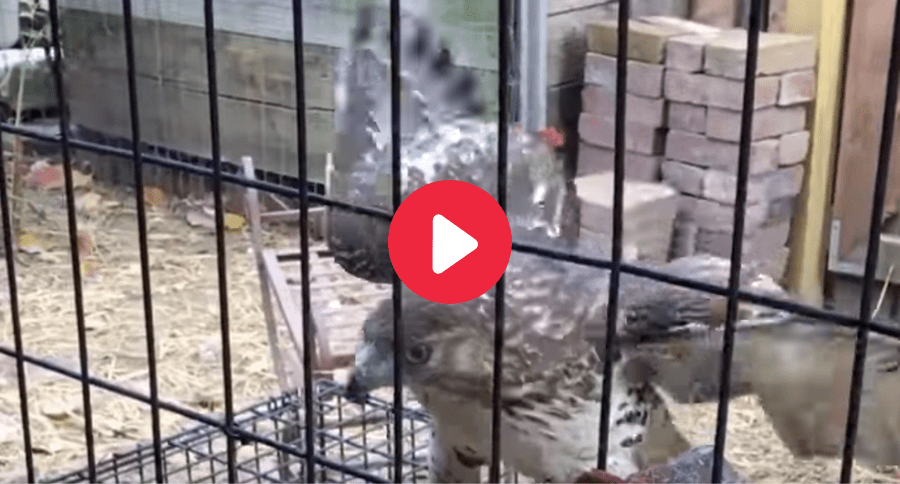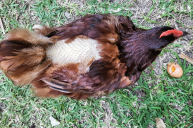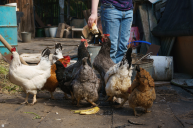Would you know what to do if your chicken was wrapped tight in a hawk's talons?
Peggy Hoelting managed to save one of her chickens from the clutches of a persistent red-tailed hawk. Hoelting has an urban St. Louis coop with eight chickens, and when she heard the hens making noise, she knew something was up.
"The chicken was screaming her head off. So I just started yelling at the hawk: 'Get out of here!" Hoelting told the St. Louis Dispatch. Hoelting battled a hawk to save her chicken, and she won.
The hawk's talons were grasped tight on the wing of her pet chicken named Wren. She managed to scare the hawk off using a wooden post and her voice.
"I didn't want to hurt it," she told the St. Louis Dispatch. "But I just tried to get it out of there."
It wasn't an easy task; the hawk persistently returned twice. Finally, Hoelting got her chickens shut into the coop, and Wren into a wire dog crate, separated from the other chickens.
"She's always been the low-man on the totem pole, so I didn't want the other chickens to bother her while she was hurt," Hoelting said.
As soon as Hoelting went into the house to call her husband, the hawk returned a fourth time and tried to get Wren through the wire dog crate. At this point, with Wren secure, she managed to scare the hawk off again while getting a good picture and some video.
Hawks, also known as raptors or birds of prey, are fierce predators. Their keen eyesight, their overhead view, and their sharp talons and beaks are a deadly combination for small animals and your chickens.
Hawks Are Federally Protected
First, you need to know that hawks are protected in the United States under the federal Migratory Bird Treaty Act of 1918 (16 USC, 703-711). It is illegal to harm them, or to hunt, trap, cage, shoot, or poison them without a permit. Doing so is punishable as a misdemeanor and with fines of up to $15,000. Some exceptions to the migratory bird act are granted for federally certified wildlife rehabilitators and certified falconers.
How to Protect Your Chickens from Hawks
https://www.instagram.com/p/B4SbaP8lMh2/
Prevention is best when it comes to protecting your backyard chickens from hawks. The best protection you can provide to your chickens is as follows:
Provide cover. Chickens are alert to predators like eagles and chicken hawks and need to be able to take cover from overhead predators in a coop, under some bushes, or under some other form of cover. Free-range chickens need a variety of cover options. Young chickens may not be as alert to overhead predators so keep an eye out if free-ranging.
Provide a covered outdoor chicken run in addition to a secure coop. A covered run or covered chicken yard has a roof, chicken wire, tarp, or netting over the top of the run fencing to deter airborne predators.
Some feather colors might give your chickens an advantage. Studies have shown that lighter feathers on chickens are more attractive to aerial predators like hawks. White chickens or buff chickens are more likely to be attacked by hawks than darker and barred-feather pattern chickens.
Shiny repellents. Some people use old cd's hung from fishing line and shiny ribbon tape to scare off predators.
Where are you likely to see hawks? You'll likely spot a neighborhood hawk either overhead or on a fence post or tree near your coop watching the action. Most hawks will not swoop down if they spot you near your chickens; they'll wait until no one is near to swoop down.
Caught in the Act: What to Do
https://www.instagram.com/p/B4uiu3hnYpj/
Finally, it is okay to scare the hawk off. It's key to make sure you don't hurt the hawk or disturb any nests.
Use your voice and your larger size to try to intimidate a bird of prey to get it to leave. A water gun is another idea—what kind of bird is going to stick around after getting super-soaked? Above all, do not harm the hawk.
In my own experience, I was able to easily scare off a red-tailed hawk that had one of my Ancona chickens in its talons. It flew to the top of a nearby tree, but unfortunately, it was too late for my chicken. Often, you will find that you have arrived too late to save your chicken.
If you can't easily scare off a hawk, then it may be wise to just back off. After all, this is a bird of prey, with a sharp beak and claws, and isn't something you would wisely tangle with if it doesn't back off when you approach. Instead of focusing on the hawk, step back and focus on your chickens. Make sure your flock is secure in the coop for the rest of the day. If your flock is secure, you have time to think about preventing a possible future attack.
After an attack, or after spotting a hawk, keep a close eye on your chickens. If your hen house is big enough, keep your chickens secured for a day or so after an attack. Work to secure your chicken yard with an overhead barrier and maybe hang some shiny stuff. The last thing you want is a hawk making your coop a meal habit.
Good luck! Protect your flock!
This post was originally published on November 11, 2017. What kind of birds of prey have you seen near your chicken coop? Do you have advice for predator problems? Let us know in the comments below.
WATCH NOW: How to Have the Best Tasting Eggs from Your Backyard Chickens




